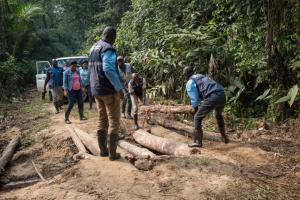Bringing Ebola vaccine to remote communities in the Democratic Republic of Congo
It’s been nearly twenty years since the residents of Bosolo village in northwest Democratic Republic of Congo have seen a car.
“Bosolo is a village which is about 25 km from Iboko centre, but on this road 25 km can take two or more hours to travel,” said Dr Ismaila Ibrahim Mamane Sani, Co-coordinator of WHO’s Ring Vaccination in the Democratic Republic of Congo.
The remoteness of the location is a challenge for the WHO vaccination team. The team needs to bring the Ebola vaccine to some of the village’s residents as part of the ring vaccination where the contacts of confirmed cases and the contacts of contacts are immunized.
In mid-May, the brother of a man who was confirmed with Ebola stopped in the village to see relatives. He was a high risk contact, who later died in the community without being tested because his family refused the Ebola test. So the WHO vaccination team had to extend their vaccination ring to Bosolo village.
Initially two doctors along with an expert in community mobilization from UNICEF rode motorcycles out to Bosolo to see if a vehicle could squeeze through the thickly covered brush.
“You have to cross four bridges, the path is very narrow and even on a motorcycle it’s a nightmare. You have to be a very good driver,” said Dr Ismaila.
However, with the help of local residents, the WHO team was able to hack their way through the Equatorial forest.
“We had to slowly open up a path for the vehicle together with the local people who helped cut down the branches,” said Dr Fofana Thierno Oumar, WHO Ring Vaccination Team.
When the vehicle loaded with the Ebola vaccine and all the medical supplies, tents, tables and chairs needed to conduct the vaccination showed up in Bosolo it received a big welcome.
“It was surprising and quite emotional because it was the first time for the children to see a vehicle,” said Dr Ismaila.
One resident confirmed that thanks to the vaccination the village children were able to get their first look at a car.
Despite the remote location, the residents of Bosolo village who are eligible for the Ebola vaccine have been receptive. By the end of the third day, the WHO team had vaccinated nearly 150 eligible people.
“They were surprised to see us come here, but the moment we arrived they were cooperative,” said Dr Ismaila.
Before being vaccinated, participants are informed by a doctor why the vaccination is recommended, the possible side effects, told it is free and voluntary and then asked if there are any questions. They sign an informed consent form and those who can’t write provide a fingerprint.
One woman who participated in the vaccination said, “I was vaccinated because everything I heard from the health workers convinced me of the importance of the vaccination.”
The ring vaccination is led by the National Institute of Biomedical Research (INRB) and the DRC’s Ministry of Health, which is working with a wide range of partners, including the World Health Organization (WHO), Medecins sans Frontieres (MSF) and UNICEF. The vaccine was provided to contacts of confirmed cases and the contacts of contacts as well as healthcare workers and front line workers. As of this writing, there were no contacts needing follow up, but the vaccinations continue with healthcare workers and front line workers. Gavi, the Vaccine Alliance is contributing towards the operational costs.
As of the 20 June, nearly 3 200 people have been vaccinated in the hotspots of Equateur Province in the DRC, as well as 13 healthcare workers in Kinshasa.



